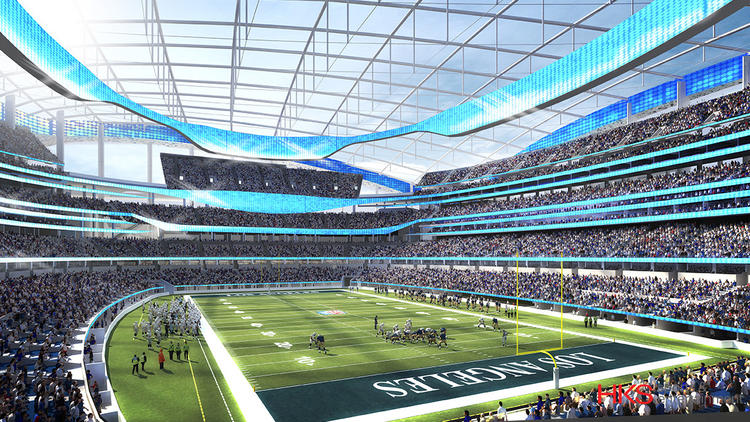Why NFL’s move to Los Angeles isn’t a sure winner
After years of the NFL leveraging Los Angeles in order to keep current franchises and its fan bases meeting their obligations to the league, the organisation has finally put its foot down in announcing the move of the St Louis Rams to the city of angels.
If it’s a move that looks and sounds hugely risky from the outside, then you’re not far off, particularly considering the trauma that would typically be associated with plucking an entire fan base from somewhere and expecting it to take in another part of the country.
However with the NFL being primarily a profit-making machine worth somewhere in the vicinity of US$12 billion, it certainly isn’t the first franchise to be moved for profit reasons and will most likely not be the last.
And with profitability and a new horizon promised for football in Los Angeles, the move from St Louis, a more entrenched fan base, to the bright lights and transient audience of the west is a lot riskier than it seems.
The move
Penned in the early 90s after years of poor fan attendance in southern California, St Louis heavily lobbied for the team to relocate to the city and play in the tax-payer funded Edward Jones Dome. With several conditions written into the deal such as the St Louis Convention Bureau needing to keep the venue ranked among the best of the NFL’s venues, the relocation looked tentative and temporary at best when the 21-year lease was signed in 1994.
With a lot of to-ing and fro-ing over where the team would play after 2015, it’s clear to many that Rams owner, billionaire real estate mogul Stan Kroenke (who took over as majority owner in 2010 – and is also from the St Louis area) saw the end of the lease as an opportunity to move back to the west coast. This is despite numerous proposals that would see a new stadium built and the Rams kept in St Louis.
However, for the Rams to stay in St Louis, the NFL would have had to contribute a substantial amount to the project (approximately US$100 million) in which NFL Commissioner Roger Goodell labelled as “unsatisfactory and inadequate” shortly after commitment from the organisation.
If you consider that Kroenke (who is worth a reported US$6.3 billion) committed to footing the entire bill for the relocation to Los Angeles including building a NFL utopia of sorts in Los Angeles which is expected to cost about $3 billion and consist of an 80,000 seat multipurpose stadium, 780,000 square feet worth of office space, 2,500 new residential units, a 300 room hotel, 25 acres of public parks, playgrounds, open space and bicycle paths, you can potentially understand where the NFL is coming from.
However, that wouldn’t placate the fans who’re losing their NFL team, something you wouldn’t read about it in the viciously protective sports environments of the UK and Europe.
The fans
St Louis is, by most accounts, unequivocally a baseball city during the spring and the summer and an ice hockey team during the winter. And with the Rams not making the playoffs in 11 years with their best finish being a 8-8 record in 2006 and 7-9 in the past four years, attendance hasn’t been particularly explosive.
However, Los Angeles is a two sport city. Dominated by the Lakers during the winter and the Dodgers during the summer, football hasn’t been on the radar for quite some time and Kroenke and his team at the LA Rams will be tasked with splintering or at least penetrating the NBA market (as the NFL and NBA share the same season) in order to attract a new fan base because they’re likely going to lose a majority of their current fan base in St Louis.
This is likely especially when you consider that Kroenke was accused of tanking by the fans and putting a poor product on the field to make the sport less popular in St Louis. On top of that, when he gained majority ownership of the team in 2010, Kroenke said he’d never take them back to LA, a promise he has broken.
Winning culture
The thing with LA sports teams and often a characteristic of cities that are of the transient nature like Los Angeles is that unless you’re winning or you’re the Lakers or Dodgers, it will be hard to establish a loyal fan base.
At one time or another, the Clippers and the LA Kings, the city’s other NBA and NHL team have both hovered in the lower reaches of crowd attendance due to them not winning. In the Kings’ case, even when they won the Stanley Cup twice, their attendance numbers failed to even break into the top 10 of the league’s attendances.
The Clippers’ recent emergence from years of being the Lakers’ bullied little sibling has seen them overtake Lakers’ attendances, proving just how important winning is to Los Angeles.
Winners or not, it’s hard to argue that the decision had any other basis than that of finances and increasing attendances – something that the NFL has placed huge emphasis on in the past.r.
The main reason
What’s really eye catching is that, with the introduction of technology and the vast improvement of viewing experiences at home, the NFL is attempting to convince people that the best place to watch a football game is in a stadium. And the ‘football mecca’ that Kroenke will build in Inglewood will be the best place to watch football and house with state-of-the-art facilities.
For me, this is undoubtedly the reason that tipped the vote in favour of the move to LA because overall attendance is continuing to drop (a decrease in 2 million attendees between 2011 and 2014) but the TV ratings are way up.
Honeymoon Period
One underlying fear of the Rams’ move to LA is that without this winning culture, the novelty of having a football team will wear off far too soon, especially when there is so much more going on in Los Angeles. Yes, the ticket sales might be good and they are so far with the LA Rams already receiving 56,000 deposits for season tickets in 2016 with former NBA star Magic Johnson tagged as the Rams’ number one fan.
But Hollywood loves a happy ending and if the Rams can’t provide them with one, the honeymoon period of this new NFL franchise will last a lot shorter than owner Stan Kroenke thinks.
*Joe Merrill is originally from St Louis and is a journalism student at the University of Missouri
About author
You might also like
Mallory Group Launches White Paper on the ‘New Normal’ for Sports Rights Holders
Sport is proving to be one of the high-profile business casualties of the Covid-19 pandemic. However, its slow and structured return will be a key factor in life entering the
The seven essentials for achieving successful sports branding
By Daniela McVicker When it comes to sports, great branding is a must. Your brand influences how people see your company or team. It helps you to forge connections with
Live Chat: A New Social Experience in Sports
Article written by John S. Kim, CEO and co-founder of global API company SendBird Social media rose to prominence throughout the world due to its potential for connection. Social channels provided the








